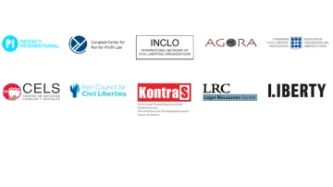Search
Content type: Advocacy
Privacy International (PI), the European Center for Not-for-Profit Law (ECNL), International Network of Civil Liberties Organizations (INCLO), Agora, the Canadian Civil Liberties Association, Centro de Estudios Legales y Sociales in Argentina, the Irish Council for Civil Liberties, KontraS in Indonesia, the Legal Resources Center in South Africa, and Liberty in the UK welcome the opportunity to provide input to the global study of the UN Special Rapporteur on the promotion and protection of…
Content type: Long Read
Zimbabwe has a history of state led surveillance that is carried out more for political gain than for the investigation of legitimate criminal activities. During former President Mugabe’s 37 year rule the government used laws and state security structures to carry out targeted surveillance of persons of political interest and more generalised mass surveillance of the population.
Specific laws such as the Interception of Communications Act as well as mandatory SIM-card registration regulations…
Content type: News & Analysis
As Amnesty International and Forbidden Stories continue to publish crucial information about the potential targets of NSO Group’s spyware, we know this much already: something needs to be done.
But what exactly needs to be done is less obvious. Even though this is not the first time that the world has learned about major abuses by the surveillance industry (indeed, it’s not even the first time this month), it’s difficult to know what needs to change.
So how can the proliferation and use of…
Content type: Case Study
The increasing deployment of highly intrusive technologies in public and private spaces such as facial recognition technologies (FRT) threaten to impair our freedom of movement. These systems track and monitor millions of people without any regulation or oversight.
Tens of thousands of people pass through the Kings Cross Estate in London every day. Since 2015, Argent - the group that runs the Kings Cross Estate - were using FRT to track all of those people.
Police authorities rushed in secret…
Content type: Impact Case Study
What is the problem
For over two decades we have been documenting an alarming use and spread of surveillance. It is no longer just the wars on terror or drugs or migration that is driving this trend. The management of health crises and distribution of welfare regularly are among others being used to justify this turn to increasingly invasive forms of surveillance. From country to country we see the same ideas and the same profiteers expanding their reach.
When we first released our report on…
Content type: Report
For nearly two decades, the Colombian government has been expanding its capacity to spy on the private communications of its citizens. Privacy International's investigation reveals the state of Colombia's overlapping, unchecked systems of surveillance, including mass surveillance, that are vulnerable to abuse.
See the report in English and Spanish.
Content type: News & Analysis
Earlier this month, only a few days before the new president of Egypt was sworn in, leaked documents from the Ministry of Interior revealed that the government is trying to acquire mass surveillance equipment capable of monitoring social networks such as Facebook, Twitter, and YouTube.
While being billed as a way to monitor social media in order to “monitor security hazards in social networks” and “identify persons representing a danger on society” (sic), past and recent actions by…






